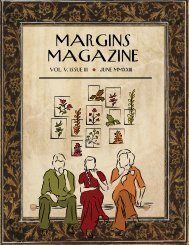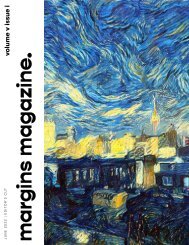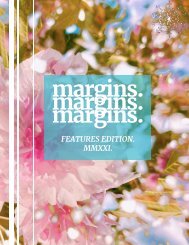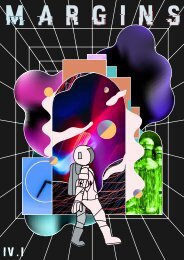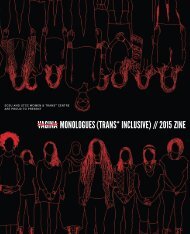Margins Magazine - Volume 3 Issue 1
2020 has been a year of immense change and upheaval thus far, with our idea around what is normal challenged in the midst of a pandemic. In this midst of these volatile times, our team at Margins Magazine has come together to create Volume 3 Issue 1 of our publication, revolving around the theme of CHANGE. In this issue, our writers have worked hard to bring you pieces that critically discuss the realities of the current moment from advocacy effort across different fields to issues such as domestic violence and colourist. At #UTSC, we connect with Radio FWD and UTERN at UTSC to learn how campus groups are affected during the pandemic and how they are evolving their programming while staying connected with students. We’ve received amazing creative submissions from members of our local community and around the world that have allowed us to curate this issue with stories that truly represent the heart, soul, and pulse of the current times. Bringing together all these voices in Margins has been a true labour of love. We truly hope that the stories, words, and art within Margins resonate with you. Follow us on Instagram @wtcmargins & LinkedIn https://www.linkedin.com/company/margins-magazine!
2020 has been a year of immense change and upheaval thus far, with our idea around what is normal challenged in the midst of a pandemic. In this midst of these volatile times, our team at Margins Magazine has come together to create Volume 3 Issue 1 of our publication, revolving around the theme of CHANGE.
In this issue, our writers have worked hard to bring you pieces that critically discuss the realities of the current moment from advocacy effort across different fields to issues such as domestic violence and colourist. At #UTSC, we connect with Radio FWD and UTERN at UTSC to learn how campus groups are affected during the pandemic and how they are evolving their programming while staying connected with students.
We’ve received amazing creative submissions from members of our local community and around the world that have allowed us to curate this issue with stories that truly represent the heart, soul, and pulse of the current times.
Bringing together all these voices in Margins has been a true labour of love. We truly hope that the stories, words, and art within Margins resonate with you.
Follow us on Instagram @wtcmargins & LinkedIn https://www.linkedin.com/company/margins-magazine!
You also want an ePaper? Increase the reach of your titles
YUMPU automatically turns print PDFs into web optimized ePapers that Google loves.
MARGINS<br />
MARGINS<br />
Instead, they regard their responsibility in terms of a soul-seeking, therapeutic cleansing: “March 2019,<br />
I felt burnt out from three years of constant work. UTERN allowed me to heal, find a community, give<br />
myself wholly and wholesomely. It brought all this shit to the forefront because there was home to be<br />
found. UTERN was that home.”<br />
As with any new home, the process of unpacking one’s belongings in an unfamiliar space is undeniably<br />
difficult. Leeza interprets their adjustment to frequent activism as being conscientious of and holding<br />
themselves accountable for previous actions: “A lot of education needs to go into it. Questions like,<br />
‘Do I know whose treaty land I’m on?’... You have to come to a community where you can talk about<br />
it, with folks who understand and validate how you’re feeling. Everyone’s at a different education level<br />
about the environment; some folks are very focused on reusing items like plastic bags which is great.<br />
Another group of folks are focused on the social issues and how they’re affecting our environment, the<br />
livelihood of our people. Together, UTERN bridges all these different components of environmentalism<br />
into one to have a discussion.”<br />
The discussion Leeza describes can be exhausting to moderate in a tri-campus environment, I point out.<br />
Leeza agrees, explaining that frequent online activity – as a result of the global pandemic, COVID-19<br />
– has allowed UTERN to become more advertised to students. “We know that being at UTSC is a<br />
huge barrier; you know, taking the TTC downtown,” they mention. “Now, we have an event where we<br />
have UTSC, St. George [University of Toronto’s downtown campus] and UTM [University of Toronto<br />
Mississauga] students all sitting in a room. When programming, we don’t have to think about just one<br />
demographic; I can meet UTM students and hear about their campus and their groups. I don’t have to<br />
look specifically to the GTA for speakers.”<br />
As expected, COVID-19 is an issue which has proven to pose vital environmental questioning. “What<br />
does a green recovery look like?” Raymond illustrates. “We’ve had those discussions in our first<br />
environmental working group. We’ve had conversations about equity, about environmental racism;<br />
not everyone has access to technology and not everyone has the ability to cope with all of the demands<br />
and barriers that COVID-19 brings.”<br />
The interconnectivity of these problems is shocking, but Leeza assures me that understanding their<br />
complexity can be made easy with one crucial tool; education. “A UTERN team member said to<br />
me recently, ‘Let’s make sure that the funding is legit for George Floyd,’” they explain. “I thought,<br />
yeah, so many people are reposting information mindlessly; let’s take the extra step and let’s be<br />
aware of it. A lot of our team is part of the BIPOC community. We need to show support for the<br />
students paying those Levy fees for us.” They elaborate that, upon further inspection, evidence of<br />
injustice can be found in our own communities: “Once you start comparing all three campuses, it’s<br />
shocking the uneven environmental development you start to see. Little things of lack of water bottle<br />
dispensers and tokenism for Indigenous folks… I ask myself who I’m getting for events. The IDC<br />
Conference, a speaker from First Nations House was like, “You don’t know about Scarborough?<br />
60 61



